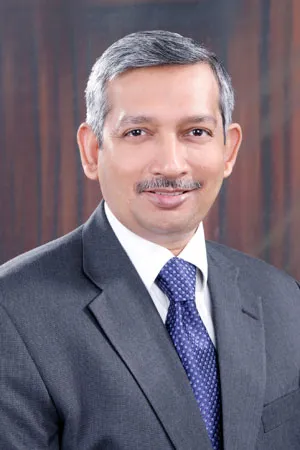‘The Indian startup ecosystem is blossoming’ – Rajesh Kumar, Tata Elxsi incub@TE
[ This article is part of the YourStory series called Startup Hatch, about incubators and accelerators in the startup ecosystem. See earlier profiles of incubators at IIT Bombay, BITS Pilani, NCL, NID, IIIT-Bangalore, IIIT-Hyderabad, Vellore Institute of Technology, and PSG Coimbatore. ]
A part of the $100 billion Tata group, Tata Elxsi is a design company that blends technology, creativity and engineering for healthcare, consumer products, defense, media, transportation and other sectors. Headquartered in Bangalore, it has offices in Dubai, France, Germany, Japan, Malaysia, Singapore, South Africa, UAE, UK, and USA. Tata Elxsi has also developed two full length movies, ‘Roadside Romeo’ and ‘Arjun – The Warrior Prince’ in collaboration with Disney.

Rajesh Kumar is Vice President, Strategic Initiatives, at Tata Elxsi. He spearheads the initiative incub@TE, an incubation center program to nurture and support aspiring entrepreneurs. The initiative is designed to create the next wave of product and service oriented technology startups in the areas of internet, mobile, social, local, enterprise, cloud and embedded applications. Rajesh was earlier with CDAC, Pune and holds a degree in Computer Science from IIT Kanpur.
Rajesh joins us in this exclusive interview on the vision and achievements of Tata Elxsi incub@TE, and the outlook for Indian startups and founders.
YS: What was the founding vision of incub@TE, and how is it supported?
RK: The primary objective of launching Tata Elxsi incub@TE incubation center was to nurture and support aspiring entrepreneurs to help them realise their full potential, by providing infrastructure, expertise and support in access to key markets and funding. While there were incubators that catered to software service startups, there was a gap for software product-oriented startups. This initiative was designed to create the next wave of product-oriented technology start-ups across internet, mobile, social, local, enterprise, cloud and embedded applications.
The platform was to enable start-ups and aspiring entrepreneurs to convert their innovative ideas into commercially viable products and services, and also help entrepreneurs associated with the program gain better market visibility, acceptance and credibility. As always, Tata Elxsi will continue to focus on technology and new product and service development and nurturing talent and innovation. Tata Elxsi incub@TE initiative is one of the country’s first technology products startup incubators from the Indian corporate sector. Tata Elxsi takes an equity stake of 10% or more in the startups incubated at incub@TE.
YS: Which companies have graduated from incub@TE so far?
RK: So far, we have incubated three startups companies on board, Big V Telecom, Sismatik Solutions and Street Smart Mobile Technologies. Two years ago, Big V Telecom became the first startup to be incubated by Tata Elxsi and out of the three, Big V Telecom has successfully completed its 18 months incubation program.
Big V Telecom was founded by Keshor Daga, and offers customised business telephony solutions for businesses and consumers. It has already deployed its solutions in select regions in India, and is looking to scale its presence across India and the global market. Big V plans to expand its pan-India and global presence through B2B sales and has already started the operational branch at Pune. Big V Telecom has acquired many established brands and passionate individuals as franchise partners and done a good amount of business across India. It has more than 15 franchises all across India.
YS: Which startups are currently hosted, and what are their offerings?
RK:
Founders: Vinay Katwe, Lokesh Rao and Madhu Gupta
Sismatik Solutions (also known as Blynk) is a provider of cloud-based, integrated technology solutions for the hospitality vertical, such as concierge services and digital advertising solutions through cloud and mobile systems. Sismatik’s research into DIY mobile app framework and cloud based digital signage solutions pushes the boundaries of next-gen hospitality technology. Sismatik has been selected as a part of the incub@TE program by Tata Elxsi, DMZ – Ryerson (Canada initiative) and NASSCOM’s 10,000 Startups initiative. Sismatik has been awarded by TechCrunch, Rackspace and Google for its technology innovation.
Street Smart Mobile Technologies
Founder: Prabhu SNM
Street Smart Mobile Technologies is a one-year old Chennai-based mobile technology startup, bootstrapped with a team size of 12. It operates from Bangalore and focuses on sniffing deals in shopping malls and shopping streets (geo-tagging) using Wi-Fi sniffing and beacon mobility solutions. Using Big Data and shopping analytics, it helps retailers target end customers in real time using cloud dashboard. Loyalty credits can be tailored by retailers based on shopping preferences. Street Smart is a shortlisted startup of NASSCOM’s 10,000 Startups Program. It has also been shortlisted by Facebook FB Start, Google Startup Launch Program and the monthly TiE Bangalore Product showcase.
YS: What would you say are the Top Three opportunities for Indian startups?
RK: The Indian startup ecosystem is blossoming. The government is on its way to creating policies which make it easier for people to start new businesses; investors are waiting to invest in promising startups; and more people than ever are taking a plunge into entrepreneurship. A recent report by the industry body NASSCOM found that India is now the fourth largest startup hub in the world, with more than 3,000 new companies. Over the next five years, that number is expected to grow to 11,500. It is being termed a ‘gold rush.’
There also challenges in India in terms of poor infrastructure, bureaucracy and the divide between the nation's urban and rural areas. Nevertheless, India is changing and a new generation of startups is producing products with global as well as domestic impact.
Adding to the list, some of the emerging sectors impacted by Indian startups are e-commerce sector, healthcare sector and taxi aggregators. These sectors are thriving with opportunity, attracting talent and contributing directly towards the Indian economy.
Implementing the big ideas, acquiring talent, mentorship, fundraising and marketing strategy are some of key challenges faced by startups in India.
YS: What is the selection criteria for startups in your accelerator?

RK: We are looking for startups in the areas of internet, social, mobile, analytics, the cloud, local and embedded applications. Team composition, execution capabilities and growth potential are some of the key criteria for selection.
YS: What support and services do startups receive in your accelerator?
RK: Tata Elxsi brings together its vast experience of enabling diverse products, services and solutions to aspiring entrepreneurs. The Tata Elxsi program has been set up to foster entrepreneurial activities in the technology space. We provide a platform for startups and prospective entrepreneurs to convert their ideas into commercially viable products or services.
We help them take their ideas to the market quickly by providing ready-to-use infrastructure, key technical consulting through in-house experts, mentorship, access to service providers, plug-n-play office and connections with people and organizations who matter. This enables the start-up associated with the program, get better visibility and an association which brings trust in their target market.
YS: What kinds of IP are being created by your startups?
RK: The challenges of the Indian market in geo-location based solutions, cloud telephony and hospitality sector are very different from the developed markets. This has led to many innovative solutions which have helped our startups differentiate their products and solutions. IPs under development primarily make innovative use of technologies to offer customized solutions for Indian and global markets.
YS: How would you differentiate incub@TE from others in the field?
RK: Tata Elxsi incub@TE initiative is one of the country’s first technology products startup incubators from the Indian corporate sector. Some of the key highlights on Incub@TE are focus, bootstrapping support, support for startups through domestic/global alliances, and long-term association with startups (up to 18 months, to ensure success).
Most of the Indian accelerators are trying to repeat the models popular in the US. Therefore we see startup cohorts going through six weeks to three or four-month acceleration programs. We strongly believe that Indian startups are not yet ready. They need nurturing and mentorship for a longer period where they can focus on their product development and refinement, experiment with a few versions of their products and a few iterations of their business models. That is the reason our incubation period is up to 18 months.
Furthermore, it is backed by Tata Elxsi, a Tata organization that brings instant credibility to startups.
YS: What would you define as success for your accelerator?
RK: We signed on the three startup companies, Big V Telecom, Sismatik Solutions and Street Smart Mobile Technologies. For example, Sismatik Solutions has plans to penetrate verticals other than hospitality and hence has a very good potential to acquire a much bigger market share collectively. It is in discussion with multiple angel investors and venture capital firms. Sismatik Solutions may soon announce angel investment from a global investment firm. Street Smart has around 150+ stores on board and continues to grow at 100 stores per month for retailer acquisition.
YS: How do you compare and contrast India’s incubators and accelerators with those of other countries like the US?
RK: This is an interesting question and perhaps it requires a separate coverage by itself! Whereas the startup ecosystem is very well established in US, it is relatively new in India but evolving at a very fast pace. The challenges faced by Indian startups are very different (for example, early stage funding is still in a very nascent stage in India), and therefore the role of accelerators and incubators are also different. Indian incubators and accelerators have to be aware of these nuances and accordingly provide an appropriate environment to address these challenges.
YS: What are your plans for the coming three-to-five years with respect to new startups?
RK: We are currently focused on startup incubation and success by leveraging our experience in emerging technologies, global presence and association with diverse industries. Success breeds success. In the next three years we hope to see a few very successful startups coming out of our incub@TE programme, which will have a major positive impact on the local startup ecosystem. We expect to incubate 12 to 15 startups in the next three years.
YS: What are your recommendations for Indian policymakers to make business easier for accelerators, investors, researchers and startups in India?
RK: Cost of capital is still very high in India. The government can enable availability of capital at reasonable cost for startups (especially debt based funding). Enabling taxation policies along with institutional support for the startup ecosystem would encourage many startup players to have their base in India.
Many startups in India and around the world are using disruptive technologies which are challenging the existing policies. Cross-border online payment systems, taxi aggregator services and driverless vehicle are some of the examples here. Perhaps policymakers have to start thinking in terms of structural changes required in policy making to enable fast and effective formulation of new policies.
YS: What are your recommendations to the startups and entrepreneurs in our audience?
RK: Startup culture is new to India. In a way, we are witnessing the first generation of startups in India as a mass movement. Implementing big ideas in a faster way is the key success to the startup companies. The old adage – the customer is king – never goes out of fashion. Therefore, implementation includes market, customer, product and solution. Therefore, startups should refrain from treating technology alone as their universe.







